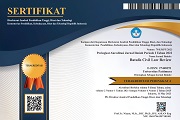The Normativity of Limited Company Under Job Creation Law Regime: A Critical Legal Studies Perspective
 ), Abdul Rachmad Budiono(2), Sukarmi Sukarmi(3), Budi Santoso(4)
), Abdul Rachmad Budiono(2), Sukarmi Sukarmi(3), Budi Santoso(4)
(1) Faculty of Law Brawijaya University, Malang, Indonesia
(2) Faculty of Law Brawijaya University, Malang, Indonesia
(3) Faculty of Law Brawijaya University, Malang, Indonesia
(4) Faculty of Law Brawijaya University, Malang, Indonesia
 Corresponding Author
Corresponding Author
Abstract
Introduction: The concept of a limited liability company based on Law Number 11 of 2020 concerning Job Creation (UU Cipta Kerja) through Government Regulation in Lieu of Law Number 2022 concerning Job Creation (Perppu Cipta Kerja) after being declared conditionally unconstitutional by the Constitutional Court, has now found its foundation again.
Purposes of the Research: This article examines the normativity of limited liability companies after the Perppu Cipta Kerja in two focuses. First, it relates to the legal ratio for the establishment of an individual company, and second, the normativity of an individual company from the perspective of Critical Legal Studies.
Methods of the Research: This paper uses a normative juridical approach
Results of the Research: Based on the type of normative research supported by conceptual, statutory, and philosophical approaches, this article concludes two: First, the legal ratio for the establishment of individual companies in the Perppu Cipgta Kerja is the government's great desire to provide convenience for MSEs in doing business and creating jobs. Second, based on the analysis of trashing, deconstruction, and genealogy, individual companies in the Perppu Cipta Kerja are still full of liberal individualism with a capitalist economic system style.Keywords
DOI
10.47268/ballrev.v4i2.1784
Published
2023-12-02
How To Cite
@article{BALLREV1784,
author = {Setijati Sekarasih and Abdul Budiono and Sukarmi Sukarmi and Budi Santoso},
title = {The Normativity of Limited Company Under Job Creation Law Regime: A Critical Legal Studies Perspective},
journal = {Batulis Civil Law Review},
volume = {4},
number = {2},
year = {2023},
keywords = {Limited Liability Company; Individual Company; Critical Legal Studies; Job Creation Law.},
abstract = {Introduction: The concept of a limited liability company based on Law Number 11 of 2020 concerning Job Creation (UU Cipta Kerja) through Government Regulation in Lieu of Law Number 2022 concerning Job Creation (Perppu Cipta Kerja) after being declared conditionally unconstitutional by the Constitutional Court, has now found its foundation again.Purposes of the Research: This article examines the normativity of limited liability companies after the Perppu Cipta Kerja in two focuses. First, it relates to the legal ratio for the establishment of an individual company, and second, the normativity of an individual company from the perspective of Critical Legal Studies.Methods of the Research: This paper uses a normative juridical approachResults of the Research: Based on the type of normative research supported by conceptual, statutory, and philosophical approaches, this article concludes two: First, the legal ratio for the establishment of individual companies in the Perppu Cipgta Kerja is the government's great desire to provide convenience for MSEs in doing business and creating jobs. Second, based on the analysis of trashing, deconstruction, and genealogy, individual companies in the Perppu Cipta Kerja are still full of liberal individualism with a capitalist economic system style.},
issn = {2746-8151}, pages = {198--223} doi = {10.47268/ballrev.v4i2.1784},
url = {https://fhukum.unpatti.ac.id/jurnal/ballrev/article/view/1784}
}
Journal Article
Arifardhani, Yoyo. “Kemandirian Badan Usaha Milik Negara: Persinggungan Antara Hukum Privat Dan Hukum Publik.” Jurnal Hukum Kemotariatan Otentiks 1, no. 1 (2019): 54–72.
Ash-shidiqqi, Ellectrananda Anugerah. “Rule of Law Dalam Perspektif Critical Legal Studies.” Amnesti Jurnal Hukum 3, no. 1 (2021): 25–36. https://doi.org/10.37729/amnesti.v3i1.895.
Briggeman, Brian C., Charles A. Towe, and Mitchell J. Morehart. “Credit Constraints: Their Existence, Determinants, and Implications for U.S. Farm and Nonfarm Sole Proprietorships.” American Journal of Agricultural Economics 91, no. 1 (2009): 275–89. https://doi.org/10.1111/j.1467-8276.2008.01173.x.
Fauzia, Ana, Fathul Hamdani, and Deva Gama Rizky Octavia. “The Revitalization of the Indonesian Legal System in the Order of Realizing the Ideal State Law.” Progressive Law Review 3, no. 1 (2021): 12–25. https://doi.org/10.36448/plr.v3i01.46.
Febriyanti, Sari; Kosariza. “Analisis Yuridis Penetapan Peraturan Pemerintah Pengganti Undang-Undang Oleh Presiden Berdasarkan Undang-Undang Dasar Negara Republik Indonesia Tahun 1945.” Limbago: Journal of Constitutional Law 2, no. 1 (2022): 123–39.
Gowder, Paul. “The Rule of Law and Equality.” Law and Philosophy 32, no. 5 (2013): 565–618.
Hayat, Rizky Saeful. “Konsep Dasar Critical Legal Studies: Kritik Atas Formalisme Hukum.” Hermeneutika: Jurnal Ilmu Hukum 5, no. 1 (2021): 235–41.
Kasih, Desak Putu Dewi, A.A. Gede Duwira Hadi Santosa, I Made Marta Wijaya, and Putri Triari Dwijayathi. “Perseroan Perorangan Pasca UU Cipta Kerja: Perubahan Paradigma Perseroan Terbatas Sebagai Asosiasi Modal.” Arena Hukum 15, no. 1 (2022): 20–37.
Nasir, Gamal Abdul. “Kekosongan Hukum & Percepatan Perkembangan Masyarakat.” Jurnal Hukum Replik 5, no. 2 (2017): 172. https://doi.org/10.31000/jhr.v5i2.925.
Prananingrum, Dyah Hapsari. “Penegakan Hukum Jabatan Notaris Dalam Pembuatan Perjanjian Berdasarkan Pancasila Dalam Rangka Kepastian Hukum.” Refleksi Hukum: Jurnal Ilmu Hukum 8, no. 1 (2014): 73–92.
Rahmatullah, Indra. “Filsafat Realisme Hukum: Konsep Dan Aktualisasinya Dalam Hukum Bisnis Di Indonesia.” Adalah 5, no. 3 (2021): 1–14. https://doi.org/10.15408/adalah.v5i3.21395.
Safitri, Murni, and Iswi Hariyani. “Ratio Legis Pendirian Perseroan Perorangan Ditinjau Dari Undang-Undang Nomor 11 Tahun 2020 Tentang Cipta Kerja.” Jurnal Ilmu Kenotariatan 3, no. 1 (2022): 36–50. https://doi.org/10.19184/jik.v3i1.34915.
Somadiyono, Sigit. “Kedudukan Hukum Anak Perusahaan Badan Usaha Milik Daerah.” Wajah Hukum 5, no. 1 (2021): 403–8. https://doi.org/10.33087/wjh.v5i1.428.
Sugiharto, Hari, and Bagus Oktafian Abrianto. “Perlindungan Hukum Non Yudisial Terhadap Perbuatan Hukum Publik Oleh Pemerintah.” Yuridika 33, no. 1 (2018): 41–72. https://doi.org/10.20473/ydk.v33i1.7280.
Triyanto, Gatot. “Ratio Legis Perbedaan Rumusan Delik Pasal 2 Dan Pasal 3 Undang-Undang Nomor 31 Tahun 1999 Jo Undang-Undang No. 20 Tahun 2001 Tentang Pemberantasan Tindak Pidana Korupsi.” Rechtens 6, no. 1 (2017): 49.
Usanti, Trisadini Prasastinah. “Perlindungan Hukum Bagi Nasabah Perusahaan Pegadaian.” Lex Journal: Kajian Hukum Dan Keadilan 6, no. 2 (2020): 154. https://doi.org/10.52947/morality.v6i2.173.
Winata, Agung Sujati. “Perlindungan Investor Asing Dalam Kegiatan Penanaman Modal Asing Dan Implikasinya Terhadap Negara.” Ajudikasi : Jurnal Ilmu Hukum 2, no. 2 (2018): 127. https://doi.org/10.30656/ajudikasi.v2i2.902.
Yara, Muchyar. “Prinsip-Prinsip Sistem Perseroan Terbatas Menurut UU No. 1 Tahun 1995.” Jurnal Hukum & Pembangunan 25, no. 3 (1995): 236–50. https://doi.org/10.21143/jhp.vol25.no3.479.
Book
HRP, Nurasiah Faqihsutan. Filsafat Hukum Barat Dan Alirannya. Medan: CV Pusdika Mitra Jaya, 2021.
Kamis, Margarito. Jalan Panjang Konstitusionalisme Indonesia. Malang: Setara Press, 2014.
Renggong, Ruslan. Hukum Pidana Khusus: Memahami Delik-Delik Di Luar KUHP. Jakarta: Kencana, 2017.
Sirajuddin, Fatkhurohman, and Zulkarnain. Legislative Drafting: Pelembagaan Metode Partisipatif Dalam Membentuk Peraturan Perundang-Undangan. Malang: Setara Press, 2015.
Suriasumantri, Jujun S. Filsafat Ilmu: Sebuah Pengantar Populer. Jakarta: Pustaka Harapan, 2013.
Thesis, Online/World Wide Web and Others
Bahasa, Badan Pengembangan dan Pembinaan. “Kamus Besar Bahasa Indonesia (KBBI): Kamus Versi Online/ Daring (Dalam Jaringan).” kbbi.web.id, 2023.
———. “Kamus Besar Bahasa Indonesia (KBBI): Kamus Versi Online/ Daring (Dalam Jaringan).” kbbi.web.id, 2016.
Indonesia Corruption Watch. “Perppu Cipta Kerja: Menegaskan Pembangkangan Konstitusi Oleh Presiden Joko Widodo Dan Penunjukkan Sikap Koruptif Pemerintah.” antikorupsi.org, January 2023.
Muhyiddin. “Ketum PBNU: UU Ciptaker Hanya Untungkan Konglomerat.” news.republika.co.id, 2020.
Perekonomian, Kementerian Koordinator Bidang. “Naskah Akademis Rancangan Undang-Undang Cipta Kerja,” 2019.
Mulyono, Andreas Tedy. “Penelitian Hukum Kritis: Independensi Hukum Kehutanan Indonesia, Khususnya Dalam Pengelolaan Kawasan Hutan Taman Nasional.” In Prosiding Seminar Nasional Hukum UMS, 248–66. Surakarta: Universitas Muhammadiyah Surakarta, 2015.
Turnady, Wibowo T. “Mazhab-Mazhab Hukum: Berbagai Aliran Hukum.” jurnalhukum.com, 2021.
UGM, Kanal Pengetahuan FH. “Quo Vadis Undang-Undang Perseroan Terbatas Pasca Berlakunya Undang-Undang Cipta Kerja.” 2021.
| Dublin Core | PKP Metadata Items | Metadata for this Document | |
| 1. | Title | Title of document | The Normativity of Limited Company Under Job Creation Law Regime: A Critical Legal Studies Perspective |
| 2. | Creator | Author's name, affiliation, country | Setijati Sekarasih; Faculty of Law Brawijaya University, Malang; Indonesia |
| 2. | Creator | Author's name, affiliation, country | Abdul Rachmad Budiono; Faculty of Law Brawijaya University, Malang; Indonesia |
| 2. | Creator | Author's name, affiliation, country | Sukarmi Sukarmi; Faculty of Law Brawijaya University, Malang; Indonesia |
| 2. | Creator | Author's name, affiliation, country | Budi Santoso; Faculty of Law Brawijaya University, Malang; Indonesia |
| 3. | Subject | Discipline(s) | |
| 3. | Subject | Keyword(s) | Limited Liability Company; Individual Company; Critical Legal Studies; Job Creation Law. |
| 4. | Description | Abstract | Introduction: The concept of a limited liability company based on Law Number 11 of 2020 concerning Job Creation (UU Cipta Kerja) through Government Regulation in Lieu of Law Number 2022 concerning Job Creation (Perppu Cipta Kerja) after being declared conditionally unconstitutional by the Constitutional Court, has now found its foundation again.Purposes of the Research: This article examines the normativity of limited liability companies after the Perppu Cipta Kerja in two focuses. First, it relates to the legal ratio for the establishment of an individual company, and second, the normativity of an individual company from the perspective of Critical Legal Studies.Methods of the Research: This paper uses a normative juridical approachResults of the Research: Based on the type of normative research supported by conceptual, statutory, and philosophical approaches, this article concludes two: First, the legal ratio for the establishment of individual companies in the Perppu Cipgta Kerja is the government's great desire to provide convenience for MSEs in doing business and creating jobs. Second, based on the analysis of trashing, deconstruction, and genealogy, individual companies in the Perppu Cipta Kerja are still full of liberal individualism with a capitalist economic system style. |
| 5. | Publisher | Organizing agency, location | Faculty of Law, Universitas Pattimura |
| 6. | Contributor | Sponsor(s) | |
| 7. | Date | (YYYY-MM-DD) | 2023-12-02 |
| 8. | Type | Status & genre | Peer-reviewed Article |
| 8. | Type | Type | |
| 9. | Format | File format | |
| 10. | Identifier | Uniform Resource Identifier | https://fhukum.unpatti.ac.id/jurnal/ballrev/article/view/1784 |
| 10. | Identifier | Digital Object Identifier | 10.47268/ballrev.v4i2.1784 |
| 11. | Source | Title; vol., no. (year) | Batulis Civil Law Review; Vol 4, No 2 (2023): VOLUME 4 ISSUE 2, NOVEMBER 2023 |
| 12. | Language | English=en | en |
| 13. | Relation | Supp. Files | |
| 14. | Coverage | Geo-spatial location, chronological period, research sample (gender, age, etc.) | |
| 15. | Rights | Copyright and permissions | Copyright: Authors who publish their manuscripts in this Journal agree to the following conditions: 1. The copyright in each article belongs to the author, as well as the right to patent. 2. Authors are able to enter into separate, additional contractual arrangements for the non-exclusive distribution of the journal's published version of the work (e.g., post it to an institutional repository or publish it in a book), with an acknowledgment of its initial publication in this journal. 3. Authors are permitted and encouraged to post their work online (e.g., in institutional repositories or on their website) prior to and during the submission process, as it can lead to productive exchanges, as well as earlier and greater citation of published work. 4. Authors have the right to self-archiving of the article (Author Self-Archiving Policy)
Licence : Batulis Civil Law Review Journal is disseminated based on the Creative Commons Attribution-NonCommercial 4.0 International license terms. This license allows anyone to copy and redistribute this material in any form or format, compose, modify, and make derivatives of this material for any purpose. You cannot use this material for commercial purposes. You must specify an appropriate name, include a link to the license, and certify that any changes have been made. You can do this in a way that is appropriate, but does not imply that the licensor supports you or your use.
|
Copyright (c) 2023 Setijati Sekarasih, Abdul Rachmad Budiono, Sukarmi Sukarmi, Budi Santoso

This work is licensed under a Creative Commons Attribution-NonCommercial 4.0 International License.

 : 1845 times
: 1845 times Download : 1110 times
Download : 1110 times














